On December 21, Mr Sartaj Aziz, the octogenarian Adviser to Pakistani Prime Minister Muhammad Nawaz Sharif on Foreign Affairs, issued a detailed statement before the Senate of Pakistan on ‘Foreign Policy of Pakistan: Achievements and Challenges’. Mr Aziz highlighted the difficult challenges Pakistan has faced as a member of the world community while also mentioning what he said were the current government’s ‘achievements’ on this crucial domain.
Before I embark on a scrutiny of important points made by the Adviser, it must be borne in mind that the Prime Minister of Pakistan is the de facto Foreign Minister whereas critics of the powerful military claim it is in fact Rawalpindi from where geostrategic decisions are taken.
‘Achievements’
1. Non-Interference
Mr Aziz acknowledged that Pakistan’s past involvement in regional conflicts had ultimately jeopardized its own internal security. He emphasized that the government’s priority for ‘Pakistan first’, before embarking elsewhere. He was indirectly referring to the participation in Afghan War (consequences of which are still being borne by Pakistan). Some critical observations he presented in support of his argument were as follows:
“Throughout the political turmoil in the ME, Pakistan took principled positions so that the fires raging the ME do not reach our shores.”
Comment: Pakistan has indeed acted quite prudently during the political turmoil across the Middle East and North Africa (MENA) region. For example, on March 28, 2011, Mr Salman Bashir, then Foreign Secretary, snubbed at Australia and said that Pakistan would “react very strongly” against any attempt to intervene in the internal events of a sovereign nation. Furthermore, he termed the no-fly zone over Libya as “a mistake“. A more in-depth study on this was published in April 2015 by Turkey-based Project on the Middle East and the Arab Spring (POMEAS). Authored by Bülent Aras (Academic Coordinator, POMEAS) and Sinan Ekim (Research Assistant, POMEAS), the report titled ‘Pakistan and the Arab Spring: No Scenario For Muslim Cooperation’ presents an unbiased analysis of Rawalpindi-Islamabad’s efforts to follow principled positions in evolving geopolitical developments. The author’s assert that during the Arab Spring, Pakistan’s foreign policy “followed country-based ad-hoc policies, rather than an overarching ‘grand’ strategy. Its foreign policy was characterized by caution, pragmatism and an eclectic approach to crises”. It is also noteworthy to note that the authors acknowledged how Pakistan articulated its changing foreign attitudes “driven through pragmatic calculations rather than religious considerations”. One would rather label the latter as ‘sectarian’, instead of ‘religious’. Anyhow, Mr Aziz’ statement that Pakistan refrained from being party to one side of the conflict stands true.
“On Syria, we supported sovereignty and territorial integrity of Syria, and called for Syrian led peaceful resolution of the crisis.”
Comment: This is also true. Pakistan has persistently adopted a neutral stance toward the Syrian crisis calling for a political (non-military) solution since 2012. In August 2012 during an international conference in Iran, then Foreign Minister Hina Rabbani Khar had reiterated Pakistan’s opposition to outside intervention in any sovereign state (in this case Syria). Ms Khar had said that any external interference “would further complicate an already complex situation”. Although observers say the then PPP regime has always had a soft corner for the Assad regime considering historic relations, the fact of the matter is that Pakistan’s principled position was based on the tough lessons it had learned since the end of the war in Afghanistan during the Cold War era. It simply opposed unwanted involvement elsewhere and understood the value of sovereignty of nation states more than anyone else, keeping in view massive ramifications they can exert.
“On Yemen, we supported Saudi Arabia’s territorial integrity and its political objectives, while expressing our support for a political solution of the crisis in Yemen.”
Comment: As far as the current regime in Islamabad is concerned, this stands to be a false statement. The ruling PML-N has traditionally been heavily pro-Gulf because of obvious reasons. It is also well known that a large segment of the Pakistani diaspora in GCC countries favor Prime Minister Muhammad Nawaz Sharif for his socio-economic understanding with the ruling sheikhdoms. Islamabad was more than willing to kneel itself before Saudi demands to join the anti-Houthi coalition but the reaction from the Senate and National Assembly sparked a heated debate which ultimately resulted in ‘moral support’ without any troop (military) commitment. This principled stance drew the ire of GCC states, especially Dr Anwar Gargash, UAE’s Minister of State for Foreign Affairs. Reportedly, the Saudi kingdom and Pakistan have reset their relationship after this major rift.
“Similar approach was followed in the Ukraine and other crises.”
Comment: It was Mr Aziz himself, who was earlier also the National Security Adviser, who stated in July 2014 that Pakistan hoped for a peaceful, political role to the Ukraine crisis within the ambit of the United Nations. A few months later in December, the European Union pressured Pakistan to condemn Russia’s role in the crisis but so far, Islamabad has successfully resisted this threat.
2. Peaceful Neighborhood
“Reached out to Indian leadership (New Delhi, Ufa, Paris, Bangkok, Islamabad). Finally, the two countries have now decided to resume dialogue, address each other’s concerns and promote bilateral cooperation. Maintained Pakistan’s principled position on the Kashmir dispute and effectively projected our view at the UN and other forums.”
Comment: This is a rather controversial claim. Although the current regime’s efforts for dialogue with India must be commended, it cannot be ignored that the joint Pak-India statement at Ufa made no mention of the outstanding Kashmir dispute. Furthermore, the impression given after NSA-level talks in Bangkok that ‘all issues would be discussed’ went up in flames when outgoing Indian envoy to Pakistan Dr TCA Raghavan clarified Indian External Affairs Minister Sushma Swaraj’s about talks on Kashmir; he said that only “Pakistan-occupied Kashmir” would be discussed during such talks. Ms Swaraj insists that the upcoming Foreign Secretary-level talks with Pakistan will prioritize the issue of Terrorism, rather than Kashmir.
“Made concerted effort to promote peace in Afghanistan (Ashraf Ghani visit Nov. 2014, PM visit May 2015). Genuine effort to facilitate reconciliation (July 2015). The efforts culminated with Heart of Asia Conference on 9 December, where a quadrilateral process was agreed to restart peace process.”
Comment: The peace talks brokered by Pakistan with mediation of China and the US have faced ups and downs, first after the confirmation of Mullah Omar’s death and later the apparent division among Taliban ranks following succession of Mullah Akhtar Mansour as the new ‘Amir-ul-Momineen’. Recently, Afghan spy chief Rahmatullah Nabil resigned in protest to President Ghani’s welcoming behavior in Islamabad. While it is true that Pakistan has once again tried to revive the peace talks, it is unlikely that the Afghan National Unity Government will regain lost trust on Pakistan. We can, of course, hope for the best for the people of Afghanistan.
“Consolidated relations with China. Chinese President Xi Jinping’s visit in April 2015, led to the landmark initiative of China-Pakistan Economic Corridor.”
Comment: This is undoubtedly a large feather in the current government’s cap for which due credit must be given. However, the recent wave of objections over the proposed route by sub-nationalist elements in KP and Balochistan have the tendency to make this project controversial. So far, the Ministry of Planning, Development & Reforms has failed to satisfy objections raised by, for example, the Pakhtunkhwa Ulasi Tehrik (PUT). Although it shouldn’t be much of concern, the fact of the matter is that the military has taken upon itself to ensure foolproof security but the government might create a national misunderstanding if grievances (whether right or wrong) are not addressed on time.
“Good neighbourly relations with Iran, which will improve further after the removal of sanctions.”
Comment: Islamabad has always enjoyed cordial ties with Tehran despite occasional border skirmishes. Iran’s National Security Adviser Rear Admiral Ali Shamkhani had visited Pakistan in October to discuss bilateral issues of interest. What Mr Aziz has not mentioned is the issue of Chabahar port’s development by India which will most certainly prove as a major bone of contention in Pak-Iran ties.
3. Global Economic Outreach
“Dependence on foreign aid undermines our self-respect as a nation. Government’s focus is on promoting trade relations and attracting investments.
• Maintained close ties with the EU, including EU’s GS plus that was secured to boost exports of our traders.
• Efforts also made to gain market access in the US, with which relations have been strengthened. Pakistan also working with US on energy projects.
• Reached out to Central Asian countries to bolster economic ties. Economic ties with Turkey and other countries have been strengthened.
• Reached out to Russia with clear focus on mutually beneficial economic projects.”
Comment: While it is true that the current regime has given preference to economic improvement over everything else (including human security, sadly), the figures say otherwise. The country’s total internal-cum-external debt stands at a whopping $65 billion. A Moody’s report issued in November said that Pakistan’s debt affordability had weakened after it shifted to non-conventional loans by issuing $3.5 billion in international bonds.
“Pakistan remained actively engaged in UN and other international forums. Pakistan was also accepted a member of the SCO.”
Comment: India too was accepted as a permanent member of the SCO alongside Pakistan during the Ufa gathering. However, Pakistan has not taken proactive measures to get early inclusion into the multilateral forum’s Regional Anti-Terrorist Structure (RATS) Council, considering it could benefit from exchange of best practices with regional countries in its own nationwide counter terrorism efforts.
Mr Aziz also re-emphasized Pakistan’s strength from its unique geostrategic position which, he said, “must not continue to be a liability”. Whether anyone agrees with it or not, it has. It is this very liability that compelled the state to subjugate to American pressure post 9/11 resulting in severe internal turmoil and the emergence of a host of new terrorist groups, now including the threat of Daesh.
He also mentioned the successes of Operation Zarb-e-Azb but one cannot help being skeptical of whether any civilian initiatives were taken to ensure long-term sustenance of these operations. The National Counter Terrorism Authority (NACTA) is still dormant, National Action Plan has not been used by the Ministry of Foreign Affairs in Islamabad to coordinate with external sponsors of our internal strife. In the long run, the absence of comprehensive government-sponsored Counter Violent Extremism (CVE) efforts will render existing measures futile. Hence, Mr Aziz’ claims here should be taken as mere rhetoric because his statement actually confirms the government has put the onus of cleanup efforts on the military.
‘Future Challenges’
Mr Aziz said that durable peace in Afghanistan and comprehensive dialogue with India i.e. neighbors on either sides will pose significant challenges in the times to come. Insofar as the sincerity of the government in Islamabad is concerned, their efforts should not be doubted but I reiterate what I said earlier: Islamabad’s competence, rather than sincerity, will decide whether or not unfolding events will shape in its favor.
image credit: dawn.com

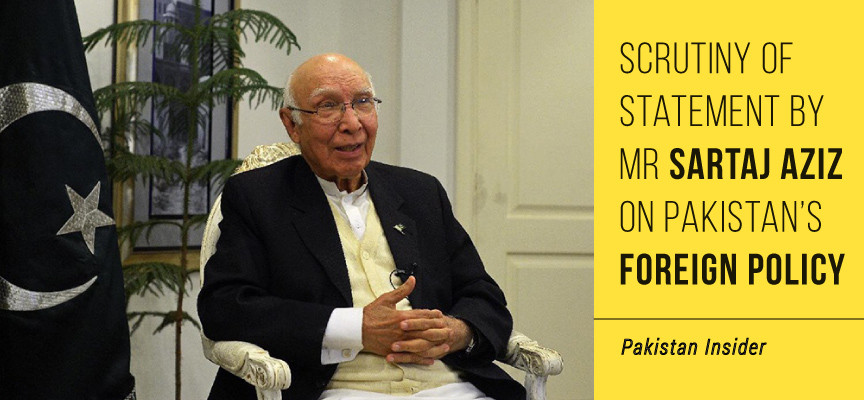
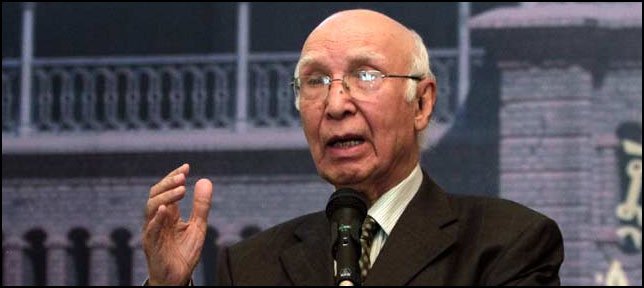

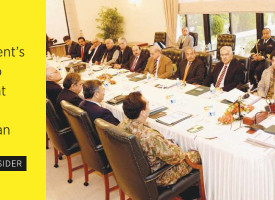


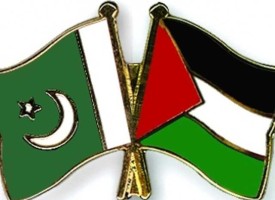
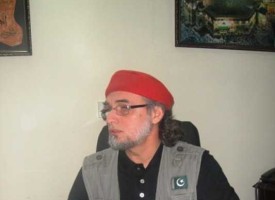
No comments!
There are no comments yet, but you can be first to comment this article.